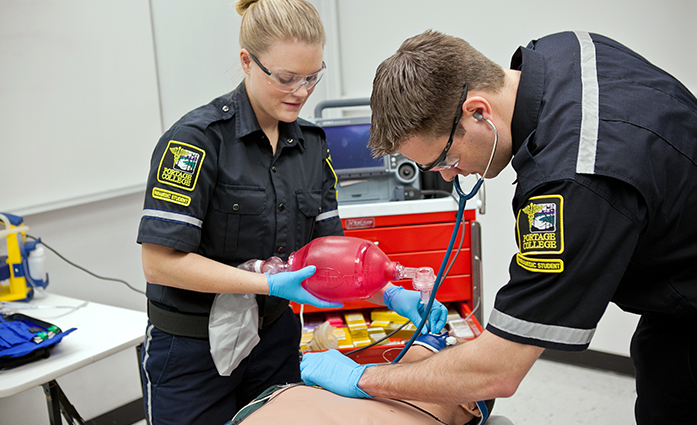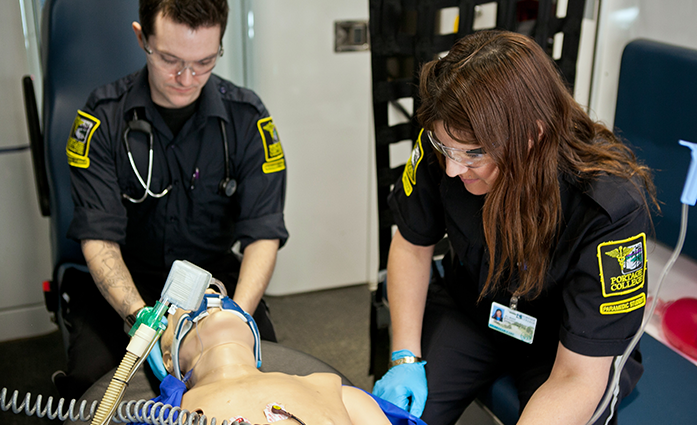Primary Care Paramedics (PCPs) are integral members of Emergency Medical Services and provide basic life support, medical and trauma care in health services and industrial settings. They may be the first to arrive on scene, they may be the only provider in remote areas, or they may work collaboratively in a team with other EMS/health care providers, first responders (i.e. Fire, Police) or community support agencies. Duties vary depending on the employment setting but responsibilities for PCPs include patient assessment, treatment, stabilization, and transportation.
This program is not available to International Students. Our Designated Learning Institute (DLI) number is O111010246767.
Please Note: This program is not eligible for post-graduate work permit (PGWP).
About the Program
The program is delivered using a blended format that offers students a unique alternative to traditional full-time, combining online classes with on-site lab sessions. This delivery format allows students to complete most of their training from their home communities for most of the training period. Students attend 10 onsite training weeks in addition to the clinical and field placements during the 40 weeks of training.

Eligibility and Selection Dates
Graduates are eligible to write the Canadian Organization of Paramedic Regulators (COPR) exam. Graduates are required to be successful in order to be eligible for provincial registration with the Alberta College of Paramedics.
Once you fulfill the educational prerequisites and provide the required paperwork, the program advisor will notify you of the exact date and time for the selection assessment. It is mandatory for you to participate in these virtual selection dates.

Career Potential
Primary Care Paramedic graduates may be employed in rural or urban ambulance services, in various industrial settings or with municipal fire departments.
Credentials
Certificate
Admission Requirements
Educational:
- English Language Arts 30-1 at 60% or English Language Arts 30-2 at 70%
- Math 20-2 at 60%
- Biology 30 at 60%
- Chemistry 30 strongly recommended
Use this chart to check Provincial high school equivalencies accepted at Portage College. Note: This is just a guide.
Students who do not meet admission requirements can contact Student Services regarding opportunities for placement testing.
Required Documents:
-
High School transcripts or equivalent
-
Standard First Aid certification (issued within one year of program start date); or Medical First Responder Certificate (issued within one year before program start date); or Emergency Medical Responder Certificate.
-
BLS – Heart and Stroke Foundation Basic Life Support for Health Care Provider (issued within one year of course start date.
Other:
- Minimum 18 years of age
-
Photocopy of current Class 5 Alberta driver’s license or Class 4 Alberta driver’s license. Completed and signed Driver’s License Waiver.
-
Police Information Check and Vulnerable Sector Check within 2 months of the program start date. Please refer to the Alberta Health Services website for student placement frequently asked questions for further information.
-
Signed Police Information Check waiver form
-
Signed Immunization Form
-
Signed Immunization and Placement Disclosure waiver forms
-
Signed Health Status Form. Please refer to the Alberta Health Services website for student placement frequently asked questions for further information.
-
ESL – All students whose first language is not English must meet one of the following:– IELTS Academic Format with minimum scores as follows: Listening 7.5; Reading 6.5; Writing 7.0; Speaking 7.0.– TOEFL iBT (internet-based) with minimum test scores as follows: Listening 23; Reading 21; Writing 25; Speaking 22.– Testing must have been completed within two years before application to the program
- iPad or Android Tablet for use with the Comptracker program.
- Following admission, the student must meet all placement pre-requisites before placements. Please refer to the Alberta Health Services website for student placement frequently asked questions for further information
- iPad or Android Tablet for use with Comptracker program
- Technical and Computer Skills required to complete the program Software Requirements: Please refer to the following link: https://www.portagecollege.ca/documents/student-services/Learning%20Resources/Moodle_Collaborate_Ultra_CLASS_Technical_Requirements.pdf
Transferability
For those interested in pursuing a career as an Advanced Care Paramedic, registration as a PCP with the Alberta College of Paramedics is a prerequisite for acceptance into Advanced Care Paramedic program.
Program Start/End Dates
August 24, 2026 to June 25, 2027
Application Deadline
February 28, 2026
Program Selection Dates
If you have met the educational requirements, you will be contacted by the program advisor with a specific date and time for the selection evaluation.
Location
Lac La Biche Campus
Delivery
Blended
Domestic Student Fees
Application Fee $53.50
Fall Term
Fee payment deadline: August 15, 2025
| Tuition | $3,221.93 |
| Student Association | $116.70 |
| Dental Insurance Fee | $163.25 |
| Health Insurance Fee | $163.25 |
| Technology Fee | $82.71 |
| Recreation Fee | $54.57 |
| Course Materials | $150.00 |
| Comptracker | $63.53 |
| BLS | $3.85 |
| Driving Course | $150.00 |
| Total | $4,169.79 |
Winter Term
Fee payment deadline: December 15, 2025
| Tuition | $3,221.93 |
| Student Association | $116.70 |
| Technology Fee | $82.71 |
| Recreation Fee | $54.57 |
| PEARS | 3.85 |
| ITLS | 168.30 |
| TDG | 24.15 |
| WHIMIS | 24.15 |
| PBA Training | 275.00 |
| Total | $3,971.36 |
Total tuition & mandatory fees for year: $8,141.15
Visit Portage Bookstore for textbooks and supplies
Tuition Deposit: $1,500 (non-refundable for oversubscribed programs)
Tuition is calculated using “cost–per–credit” one University credit is $170.00 and one Pre Health-Credit is 198.00. Calculate the cost by multiplying the number of credits per course, course dependent.
Need help funding your education? Check out our funding options.
Fee Explanations
Students’ Association Fees
These fees are authorized by student referendum and the Board of Governors. They are collected by the College on behalf of the Students’ Association in accordance with the Post Secondary Learning Act.
Health & Dental Fees
You may opt-out of the Dental and Health Insurance plan if you provide proof of comparable coverage for an extended health and/or dental care benefits plan.
Any questions regarding SA Fees including the Health and Dental Insurance fees should be directed to the SA Office 780-623-5609.
Athletics & Recreation Fees
These fees are collected to provide recreation and leisure opportunities that promote students’ physical, social, and emotional well-being, whether online or through in person facilities. Check out your +region in the link, to see what is offered at your campus or online.
Technology Fee
This is a mandatory fee assessed to students enrolling in any credit course (except for apprenticeship programs) at Portage College. The fee supports the on-going maintenance and upgrades to administrative systems that support the entire College infrastructure.
As such, it is considered a “mandatory non-instructional fee” and, therefore, is subject to Alberta Advanced Education Public Post-Secondary Institutions’ Tuition Fees Regulations. Visa students are charged the same rate as Canadian residents for this fee.